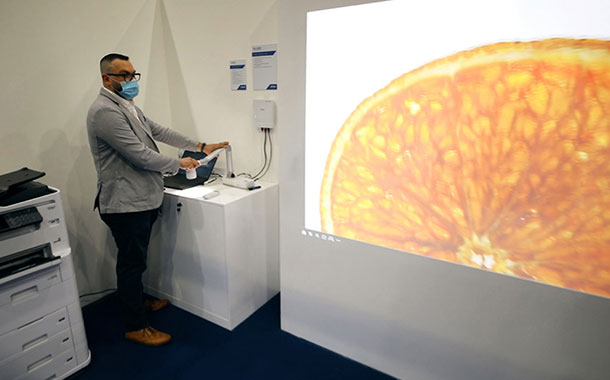The Middle East market is now looking for technology that helps remote workers and students stay connected, observes Jason McMillan from Epson Middle East.
Key products and solutions being presented on the stand or virtually.
Epson is showcasing its range of sustainable solutions for businesses and education that also support the current need for social distancing. Epson has seen a strong demand for its technology to help support new hybrid work and learning environments. The Middle East market is now looking for technology that helps remote workers and students stay connected, as well as being flexible, cost-effective, and eco-friendly.
This year’s demonstration areas, Sustainable Solutions for Business and Smart Solutions for Education, will give a flavour for how technology can deliver both efficiency and cost savings, as well as support the growing demand for sustainability.
This year’s demonstration area will highlight the benefits of Epson’s Heat-free business inkjet technology which enables its printer range to reduce energy consumption by up 95% compared to laser printers, reducing both cost and CO2 emissions. The lack of heat also means there is no warmup time needed, ensuring fast first page-out speeds and improving productivity. And fewer consumable parts mean less user intervention and fewer used consumables to store and dispose of.

Jason McMillan, Sales Director, Epson Middle East.
Key activities planned on the stand.
GITEX visitors, and businesses in the UAE and Middle East, must adapt to ensure they’re ready for the next wave of the sustainability revolution; this is the biggest opportunity for forward-thinking organisations, looking to make simple but high-impact changes. Among the solutions that are on display are workForce Enterprise and RIPS business inkjet printers; SureColor Large Format Printers for textile printing; EcoTank ink tank printers for consumer printing all equipped with a refillable ink tank; Moverio Smart Glasses, which allow for real-time collaboration between remote experts and on-site personnel; Interactive display solutions, which are designed to reduce an organisation’s environmental footprint and minimise power consumption, thanks to an energy-efficient basic design and power saving modes, leading to lower intervention; and Mobile Point of Sale solutions, which can save on energy costs.
In education, Epson’s interactive display solutions for example, such as the Epson EB-1400 series, are smart solutions that can help bring a class together. To help teachers engage remote students in a lesson, Epson’s visualisers allow for the live projection of 3D objects. Schools and universities can also benefit from efficient, secure and sustainable printing with the WorkForce Enterprise and WorkForce Pro RIPS business inkjet printers.
Key takeaways for visitors.
Epson returns to GITEX to show how simple switches to using smart, sustainable technologies can save money while helping to make organisations greener and more flexible.
Organisations that invest in smart technologies now, especially in printing technologies, can find long-term savings in cost of ownership. In calculating the cost savings for business inkjet printers, if every business laser printer in the UAE and Saudi Arabia was switched to an Epson business inkjet printer, up to $3.6 million could be saved in electricity costs every year, money that companies could invest in their own additional sustainability initiatives.
Epson offers contactless printing solutions, cloud-based solutions, and many remote-working software, making sustainability and smart choices for offices, both remote and hybrid, and the educational sector.

Epson at Gitex 2020.
Regional and global go to market announcement for 2021.
Covid-19 has accelerated a lot of trends and the digital transformation in every industry sector is opening new opportunities for the office of the future. Digital transformation is causing a rapid adoption of contactless printing, lower intervention tech solutions, and hybrid work and education models, all of which are here to stay.
While the recent months have changed the way we live and work, especially with social distancing practices and reducing touchpoints, contactless and socially-distanced offices are the new norm, from socially distanced desks to social distanced circles on floors. Middle East organisations that adopt innovative technology now can enable the socially distanced office to meet government guidelines and to maintain business continuity. Investments in innovative technologies can also lower total cost of ownership and deliver innovative new business models.




